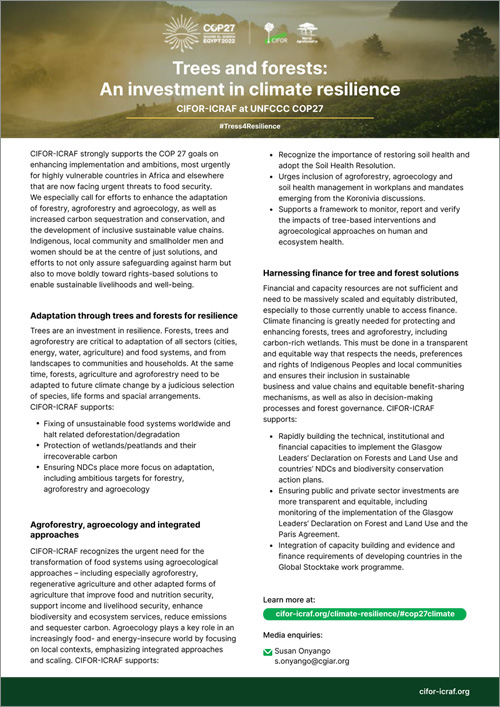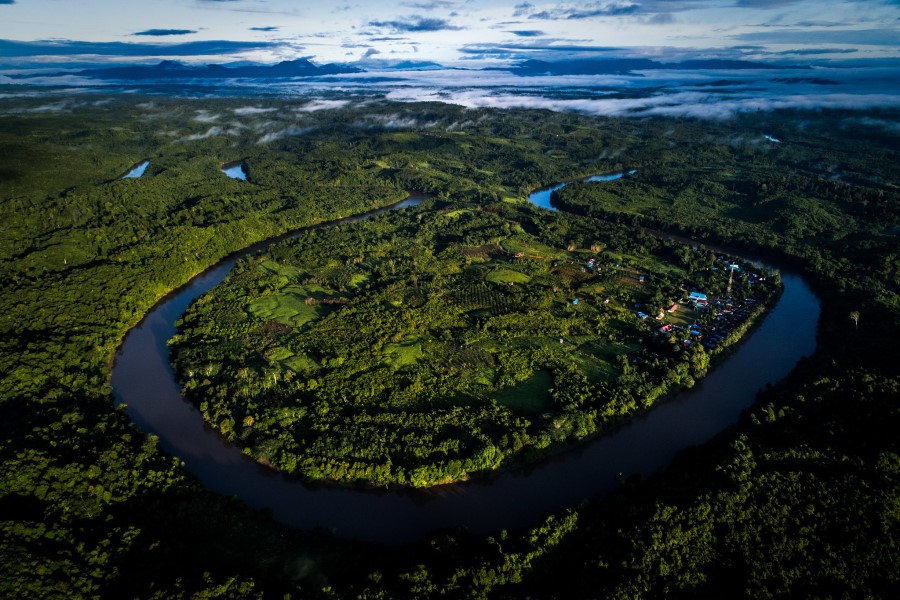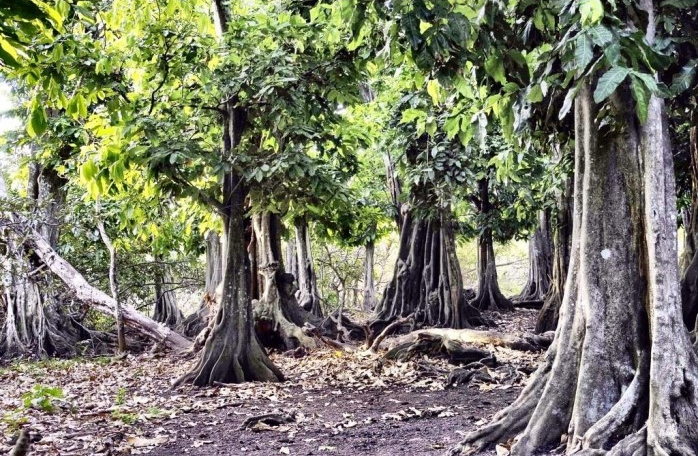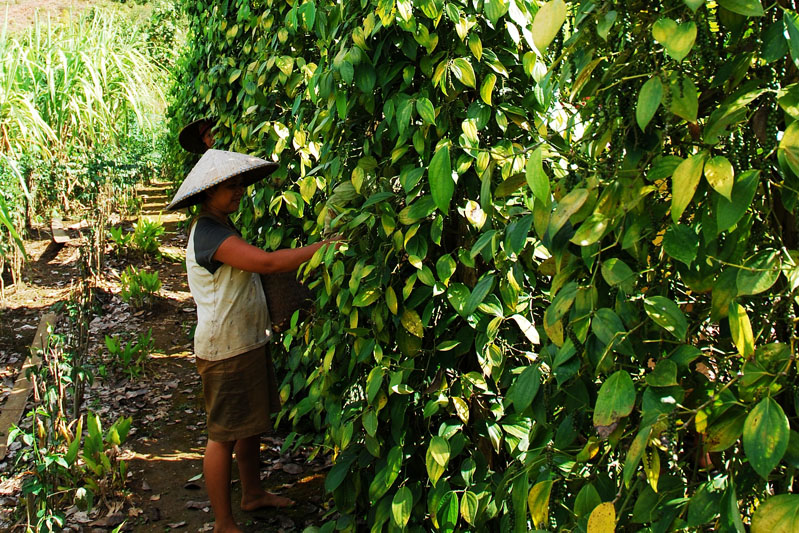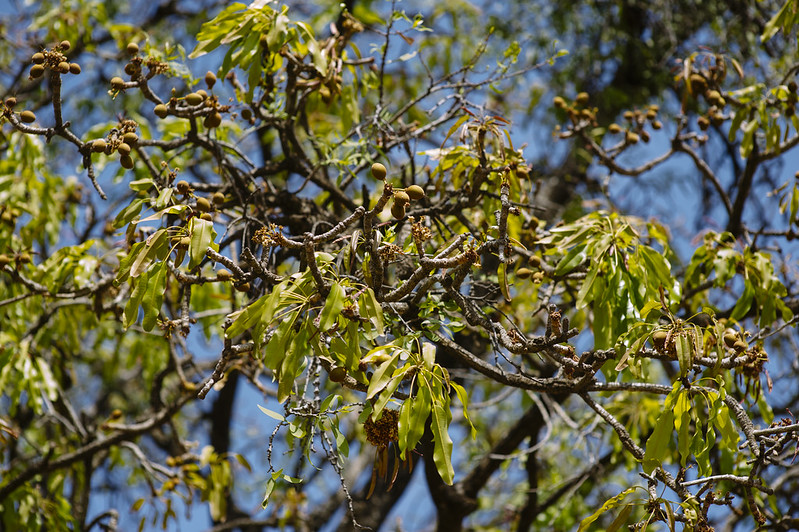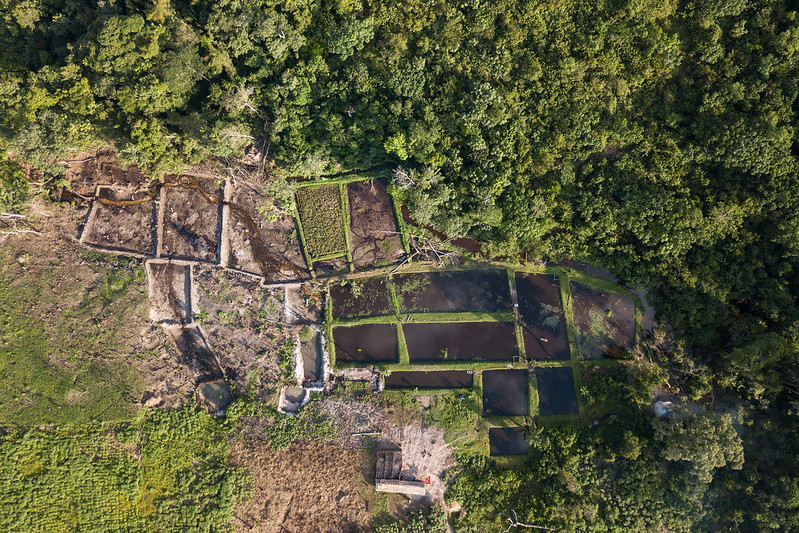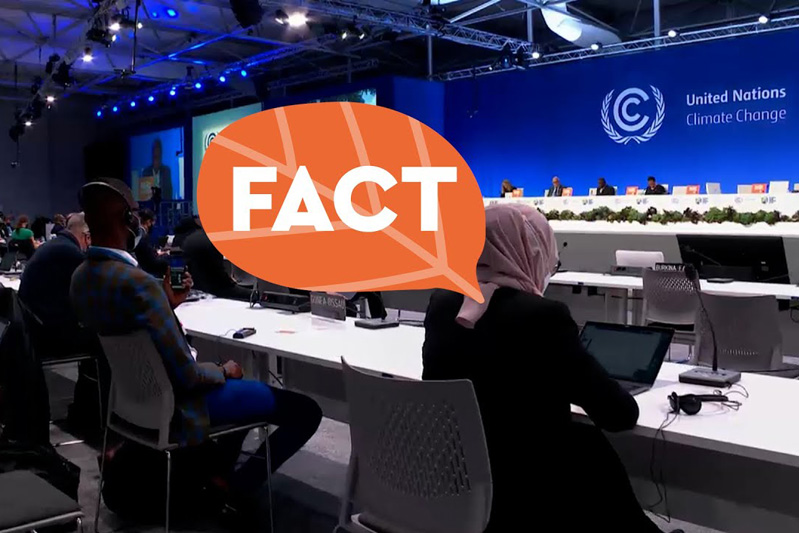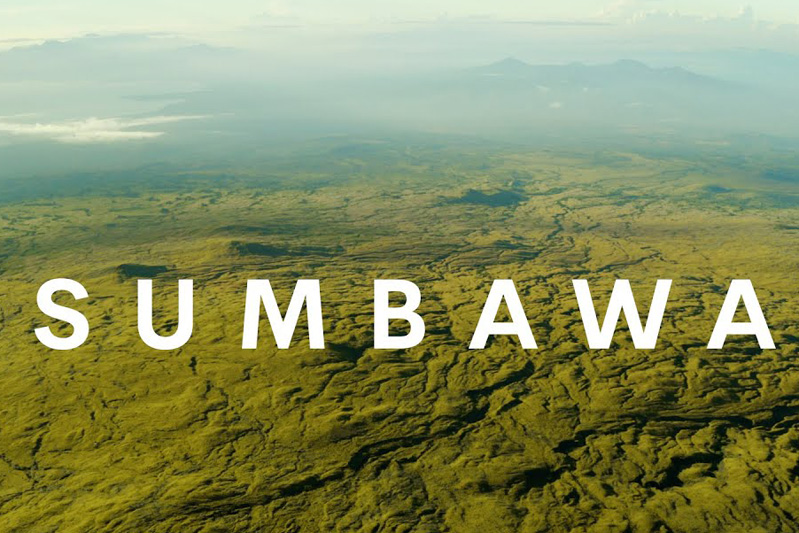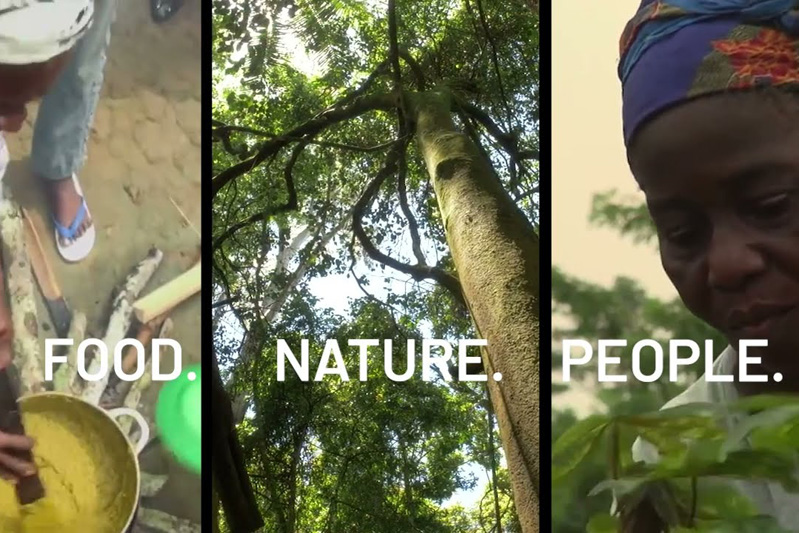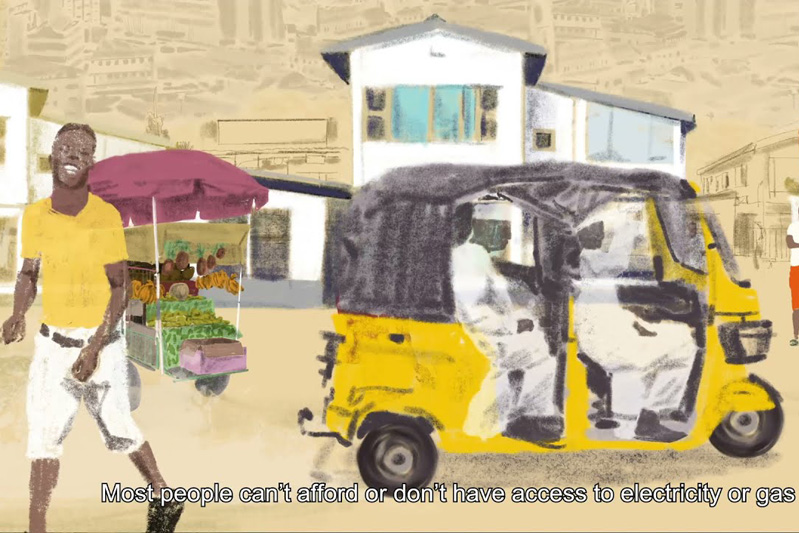
CIFOR-ICRAF at UNFCCC COP27
Trees and forests: An investment in climate resilience
The 27th Conference of the Parties of the UNFCCC (COP 27) takes place in November 2022, hosted by the Government of the Arab Republic of Egypt. The conference will build on previous successes and pave the way for ambitions to effectively tackle the global challenge of climate change.
UNFCCC event page Official host country website COP27 website
Highlights
7 Nov
8 Nov
LOCATION
UK PavilionThis event brings together producer and consumer countries, some of the largest global traders and brands, civil society, and indigenous communities, to reflect on progress to date and explore the challenges and opportunities for turning ambition into collective action. We will assess progress on the FACT Dialogue’s Roadmap for Action, the Agricultural Commodity Companies Roadmap for increased supply chain action, and the Indigenous Peoples and local communities (IPs and LC) Forest Tenure Donor Pledge.
The Congo Basin is home to the largest carbon sink in the world, absorbing 4% of global emissions annually, regulating Africa’s climate, and supporting 80 million people’s livelihoods. This event will explore the vital importance of the Congo Basin, discussing challenges and solutions with key stakeholders to drive forward action.
9 Nov
LOCATION
Indonesian PavilionThis panel will discuss this pivotal moment the world is facing in everyone’s continuous effort to combat climate change. Speakers from the private sector, government and research sectors will shared various views and experiences on how can work together to help Indonesia achieve net Zero ambitions by 2060.
LOCATION
Sustainable Agriculture of the Americas PavilionOn the sidelines of COP27, this high-level event will bring together key government, civil society, and C- Suite leaders in climate innovation from across the planet to showcase ground-shifting thought leadership and path-breaking ideas that accelerate the scaling of regenerative agriculture across the planet.
LOCATION
Food4Climate PavilionConflict, COVID, and climate change have exposed the vulnerabilities of our food systems as a direct result of our dependency on costly chemical inputs, lengthy commodity chains, and over-reliance on staple foods imports. The livelihoods of small-scale farmers and consumers around the world will be greatly impacted unless we upscale practices that work with nature and deliver on the sustainable development goals, such as agroecological, organic, and regenerative farming.
LOCATION
We Mean Business Pavilion – Auditorium ALOCATION
Indonesian PavilionLOCATION
COMIFAC-EECAS Initiatives Pavilion – Room Blue Zone, Hall C, Pavilion 78UNFCCC Official Side Event
Forest climate mitigation until 2030: Tracking progress, informing action
LOCATION
Room AkhenatenOne year ago, 141 governments signed the Glasgow Leaders’ Declaration on Forests and Land Use committing to halt and reverse deforestation by 2030. Only eight years remain to achieve these twin goals, and recent data suggests we are not yet on track to succeed. Information gaps remain on the effectiveness of actions to achieve global and national pledges, and their impacts on the environment and social justice.
UNFCCC Official Side Event
Achieving climate resilient development in Africa and Asia
LOCATION
Room 7Speakers will synthesise research in Kenya, Namibia, Indonesia, India to extend IPCC’s AR6 Ch.18 on Climate Resilient Development Pathways. They will outline risks and contexts including fire, hazard, blue carbon agriculture, and governance lessons towards socially-just and climate-resilient development.
LOCATION
Indonesian Pavilion10 Nov
LOCATION
WWF PavilionLOCATION
COMIFAC-EECAS Initiatives Pavilion – Blue Zone, Hall C, Pavilion 7811 Nov
LOCATION
VirtualLOCATION
Food Systems PavilionHealthy soil is the foundation of sustainable and regenerative food systems and provides vital ecosystem services, while also representing significant emission-saving opportunities. Efforts to combat desertification, to move from scarcity to prosperity, will need to consider how to scale soil health, globally. With over one-third of the Earth’s surface degraded and over 3.2 billion people negatively affected by degradation, continuing business as usual is no longer an option. Now is the time for multi-stakeholder action to build an enabling environment at multiple levels for supporting, financing, scaling, and monitoring healthy soil ecosystems.
UNFCCC Official Side Event
Adaptation and NDCs in Africa and Asia: How much progress in the agroforestry and forestry sectors?
LOCATION
OsirisSpeakers at this session will discuss progress on the integration of adaptation actions into NDCs in Sub-Saharan Africa and Asia. Focus will be on options for enhancing targets and integration, tracking progress, investments and capacity building for both agroforestry and forestry adaptation practices.
GLF Climate 2022
Promise and practice: How landscape approaches can accelerate action and help tackle the triple planetary crisis
LOCATION
The Egypt HallLOCATION
Indonesia PavilionIndonesia’s first NDC was submitted to the UNFCCC in 2016. In 2021, the country updated this pledge to reduce greenhouse gas emissions by 29 percent (unconditional) and by 41 percent (conditional on international support) by 2030. In the adjusted NDC, Indonesia is targeting to reach a net carbon sink in the forestry and land use (AFOLU) sector by 2030.
LOCATION
Africa PavilionIn response to Egyptian COP27 Presidency’s call for new initiatives that support adaptation action on the ground and private sector engagement, the African Development Bank (AfDB) in collaboration with the European Bank for Reconstruction and Development (EBRD) other international organizations and African governments, are launching a stakeholder consultation on the operationalization of the Adaptation Benefits Mechanism. This is a new global instrument for mobilizing public and private sector finance for activities enhancing the resilience of vulnerable communities and ecosystems.
LOCATION
Food Systems PavilionAccording to The Land Gap Report, over 1 billion hectares of land is implied in countries Net-Zero or NDC pledges, more than can be assumed available. Ensuring biodiversity, food security, land rights and other ecosystem services can see land contribute to climate change mitigation without creating a ‘land gap’.
12 Nov
LOCATION
The Egypt HallFood systems change, even ‘transformation’, has been highlighted as a way to accelerate adaptation and mitigation in agriculture. As the focus shifts from ambition to implementation, key questions remain about how to tangibly implement food systems change. Yet many of the necessary building blocks have already been identified and trialed through research-for-development projects.
LOCATION
The Egypt HallGLF Climate 2022
Securing land and territorial rights for Indigenous Peoples and local communities under the UN Decade on Ecosystem Restoration
LOCATION
The Egypt HallLOCATION
India PavilionGlobal food systems account for more than one-third of anthropogenic greenhouse gas emissions. Cereal-based food systems do not sustainably produce quality and nutritious food and negatively impact the ecological cycles, environment, climate, livelihood, poverty and equity, governance, and resilience. The assessment of global diets in the last three decades elucidates the declining trend of vital elements and diversity in food and increased dependence on a few staple crops.
14 Nov
Oceans and Land Day at the UNFCCC 4th Capacity Development Hub
Leveraging local adaptation knowledge to scale up nature-based solutions
LOCATION
Capacity-building Hub, Tonino Lamborghini International Convention CenterLOCATION
Indonesian PavilionThis session will contribute to discussions on the urgent need to tackle climate change and reach 1.5 Degrees Celsius effectively and timely through a collective response under Indonesia’s Nationally Determined Contributions (NDCs) which also aligns with the enhanced transparency actions of the Paris Agreements.
LOCATION
UK PavilionLOCATION
COMIFAC PavilionThe general assembly of the 19th Meeting of Parties of the Congo Basin Forest Partnership (CBFP) held on 8 July 2022 decided to set up a task force to develop key elements for the political debate on a concept for long-term sustainable financing of ecological services of forests and peatlands in the Congo Basin – in line with the “COMIFAC Declaration” of September 2021 in Berlin.
15 Nov
UNFCCC Official Side Event
Partnerships to accelerate action to protect blue carbon ecosystems for mitigation and adaptation
LOCATION
Room: ThutmoseSpeakers will illustrate how partnerships across different sectors are key to driving credible action for the protection and restoration of blue carbon ecosystems – mangroves, seagrasses, tidal marshes – contributing to climate change mitigation, adaptation, biodiversity, ocean economies and livelihoods of coastal communities.
High-level Ministerial Side Event
Towards global action for drought resilience
LOCATION
Room: OsirisDrought puts livelihoods and ecosystems at risk. This high level session will feature the importance of a collaborative approach to address drought the global, regional and national levels, through holistic approaches that include early warning, prevention, response and ultimately building drought resilience.
16 Nov
LOCATION
Hybrid – Tropitel, Sharm el Sheikh and OnlineLOCATION
Food and Agriculture PavilionInterconnected action at various levels is needed to achieve ecosystem and community resilience across the Sahel. Speakers will highlight the potential for nature-based solutions to increase resilience and harness finance for the Great Green Wall. The session will showcase applications of nature-based solution approaches helping to restore the Sahel and address food insecurity, climate change and biodiversity loss.
UNFCCC MAIN SIDE EVENT
Implementing Adaptation Strategies for Climate Change Using Planning, Forestry, Agriculture & Land-use
LOCATION
OsirisLOCATION
COMIFAC-EECAS Initiatives Pavilion – Room Blue Zone, Hall C, Pavilion 78The forests of the Congo Basin, the second largest tropical forest on the planet after the Amazon, play a major role in regulating regional and global climate. These forests cover southeastern Cameroon, Gabon, Republic of the Congo, the northern and central Democratic Republic of the Congo, and portions of southern and central Africa.
LOCATION
Food and Agriculture PavilionLOCATION
Francophonie pavilionThis session aims to take stock and explore ways to better take peatland issues into consideration in the definition and implementation of climate change responses. More specifically, the session will address the status of ongoing mapping activities and efforts to integrate peatlands into climate change response processes in Central Africa.
LOCATION
Food and Agriculture PavilionDirectly speaking to the Glasgow Leader’s Declaration on Forests and Land Use, the event will feature speakers from governments, producer organizations and key international partners who work on agrifood systems transformation to reduce deforestation and land degradation. They will present examples of agriculture-forestry win-win opportunities that directly contribute to climate change mitigation, resilient landscapes, food security and improved livelihoods.
17 Nov
LOCATION
Francophonie pavilionThe Congo Basin forests play an important role in regulating the regional and global climate. The protection of these forests through climate mitigation actions has taken precedence over adaptation to climate change, which is however the priority for the African continent. Reducing Emissions from Deforestation and Forest Degradation (REDD+) is high on the climate agenda of Central African countries. On the eve of COP26, a plea was made for funding to support forestry research in the Congo Basin.











